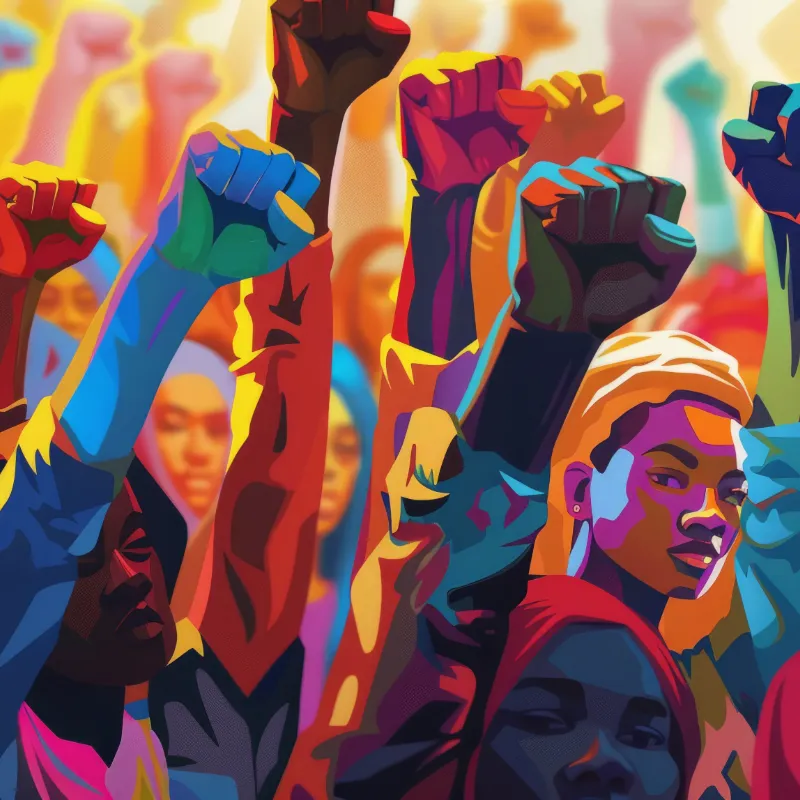Right now, being Black in America still means increased fear of violence, an inherent lack of information for families to live healthy lives, lower wages, increased criminalization, and constant threats of death—all because of the color of your skin. Living in a world that is not designed for you to thrive chips away at your humanity and dismantles your very being. And, in a short time, this year has put a spotlight on issues that long have affected those in marginalized communities—specifically Black folks.
COVID-19 has left millions of Americans without the ability to take care of themselves and their families. Marginalized folks, who already are doing the best that they can to survive, have been forced to rely on unemployment or a meager stimulus check, which throws them deeper into the margin that pushes them further away from living healthy lives. In many situations, there is no choice to stay home and social distance while avoiding the risk of getting sick from COVID.
Within these systemically underserved communities, people are less likely to have health insurance and more likely to have chronic health conditions. Access to affordable, quality healthcare is merely one barrier of many that Black folks face as they try to navigate through systems designed to work to the advantage of those in positions of privilege and power.
The recent, tragic murders of Ahmaud Arbery, Breonna Taylor, and George Floyd have brought forward yet again a trend of police brutality against innocent Black folks that spans several generations.
Today, our communities are in crisis and literally on fire. The threat of two viruses are in full effect right now: COVID-19 and racism.
From the beginning, Provide has been committed to ensuring that we all have reproductive agency. We stand in solidarity with our folks across the country, and in our communities where innocent people have died because of racial injustice in recent years. We grieve the loss of lives and the many others who aren’t listed, who the world doesn’t know because their lives were taken by people who believed they didn’t matter.
- In Alabama: Emantic Fitzgerald Bradford Jr., Gregory Gunn
- In Florida: Tony McDade, Kwame Jones, Gregory Hill Jr., Trayvon Martin, Jamee Johnson
- In Georgia: Samuel David Mallard, Yassin Mohamed, Anthony Hill, Jamarion Robinson, Jimmy Atchison, D’Ettrick Griffin, Ahmaud Arbery
- In Kentucky: Breonna Taylor
- In Louisiana: Christopher Whitfield, Wendell Allen, Victor White lll, Alton Sterling, DeJuan Guillory
- In Mississippi: Antwun Shumpert
- In North Carolina: DeAndre Ballard, Akiel Denkins, Keith Lamont Scott
- In Oklahoma: Terence Crutcher
- In South Carolina: Ariane McCree, Walter Scott
- In Tennessee: Brandon Webber
Provide brings more than 25 years of experience working within healthcare and social service industries to support professionals. Our work stems from the Black women that have paved the way for reproductive justice.
In 1974, Elaine Brown became the first woman chair of the Black Panther Party and worked to shift the party’s focus. Because of her, women were seen as more than just child-bearing bodies, and the party included a space for Black women’s reproductive rights.
Simultaneously, Byllye Avery was volunteering for a legal abortion referral network and later went on to launch the National Women’s Health Project, which is now known as the Black Women’s Health Imperative.
Supporting the #BlackLivesMatter movement means ensuring Black Americans have access to affordable, quality reproductive care, along with access to healthcare education and medical referrals.
Provide is committed to ensuring that everyone has reproductive agency and bodily autonomy. Our work is rooted in the knowledge that intersecting factors such as race and class affect marginalized communities differently.
Moving forward, we are calling on our non-Black allies to support Black communities, leaders and organizations and to join us in taking action, because Black lives should matter to everyone. Reproductive justice is a human right. Reproductive justice means racial, social, and economic justice.


